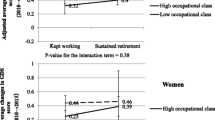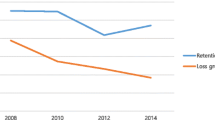Abstract
Objective
This prospective cohort study investigates the relationship between the onset of disability and employment status.
Methods
We investigated 3,741 community-dwelling adults aged 70 or older, who participated in a population-based cohort study in Japan. Their onset of disability was monitored monthly using the long-term care insurance certification registration system, for five years from baseline. Based on an employment status questionnaire, we categorized participants into three groups: (1) employee, (2) self-employed, and (3) not working. Covariates included demographic information, medical history, number of medications, educational level, living alone, social group engagement, smoking status, walking speed, instrumental activities of daily living, global cognitive function, and depressive symptoms. Missing values were managed using multiple imputation. Cox proportional hazard models were used to calculate hazard ratios (HRs) with 95% confidence intervals (CIs) for incident disability risk by employment status.
Results
The disability incidence rates were 15.3/1,000 (95% CIs: 10.7–22.0) person-years among employees, and 33.0/1000 (95% CIs: 24.4–44.6) and 39.6/1000 (95% CIs: 36.5–43.0) person-years among self-employed and non-working participants, respectively. The adjusted HRs for the onset of disability among non-working and self-employed participants were 1.69 (95% CIs: 1.16–2.46, p = 0.007) and 1.63 (95% CIs: 1.01–2.62, p = 0.044) compared with employees, respectively. Similar results were found among men. Among women, disability onset was not associated with employment status.
Conclusions
Older adults’ risk of disability onset differed according to their employment status. Older employees had a lower risk of disability onset than those not working or self-employed.


Similar content being viewed by others
Data availability
The datasets generated during and/or analyzed during the current study are available from the corresponding author on reasonable request.
Abbreviations
- LTCI:
-
Long-term care insurance
- BADL:
-
Basic activities of daily living
- NCGG-SGS:
-
National Center for Geriatric and Gerontology-Study of Geriatric Syndromes
- MMSE:
-
Mini-mental state examination
- IADL:
-
Instrumental activities of daily living
- GDS-15:
-
Geriatric depression scale-15
- HR:
-
Hazard ratio
- CI:
-
Confidence interval
References
Andersson P (2008) Happiness and health: Well-being among the self-employed. J Socio-Econ 37(1):213–236. https://doi.org/10.1016/j.socec.2007.03.003
Anxo D, Ericson T, Miao C (2019) Impact of late and prolonged working life on subjective health: The Swedish experience. Eur J Health Econ 20(3):389–405. https://doi.org/10.1007/s10198-018-1005-z
Benavides FG, Benach J, Diez-Roux AV, Roman C (2000) How do types of employment relate to health indicators? Findings from the second European survey on working conditions. J Epidemiol Community Health 54(7):494–501. https://doi.org/10.1136/jech.54.7.494
Bjelajac AK, Bobić J, Kovačić J, Varnai VM, Macan J, Smolić Š (2019) Employment status and other predictors of mental health and cognitive functions in older Croatian workers. Arh Hig Rada Toksikol 70(2):109–117. https://doi.org/10.2478/aiht-2019-70-3254
Buchman AS, Boyle PA, Wilson RS, Fleischman DA, Leurgans S, Bennett DA (2009) Association between late-life social activity and motor decline in older adults. Arch Intern Med 169(12):1139–1146. https://doi.org/10.1001/archinternmed.2009.135
Cabinet Office Japan (2022c) Annual report on the ageing society FY2022c, Section “Materials and Methods”. Trends of Living of the Elderly (Koureisya No Kurashi No Doukou) (in Japanese)
Cabinet Office Japan (2022a) Annual report on the ageing society [summary] FY2022a.
Cabinet Office Japan (2022b) Annual report on the ageing society FY2022b, Section “Materials and Methods” Trends of Living of the Elderly (Koureisya No Kurashi No Doukou) (in Japanese)
Carrino L, Glaser K, Avendano M (2018) Later pension, poorer health? Evidence from the new State Pension age in the UK: Harvard Center for Population and Development Studies working paper series. SSRN Journal. https://doi.org/10.2139/ssrn.3195760
Davies LE, Spiers G, Kingston A, Todd A, Adamson J, Hanratty B (2020) Adverse outcomes of polypharmacy in older people: systematic review of reviews. J Am Med Dir Assoc 21(2):181–187. https://doi.org/10.1016/j.jamda.2019.10.022
Di Gessa G, Corna L, Price D, Glaser K (2018) The decision to work after state pension age and how it affects quality of life: evidence from a 6-year English panel study. Age Ageing 47(3):450–457. https://doi.org/10.1093/ageing/afx181
Fujiwara Y, Shinkai S, Kobayashi E, Minami U, Suzuki H, Yoshida H et al (2016) Engagement in paid work as a protective predictor of basic activities of daily living disability in Japanese urban and rural community-dwelling elderly residents: An 8-year prospective study. Geriatr Gerontol Int 16(1):126–134. https://doi.org/10.1111/ggi.12441
Grégoris M, Deschamps F, Salles J, Sanchez S (2017) Health assessment of self-employed in the food service industry. Int J Occup Environ Health 23(3):234–242. https://doi.org/10.1080/10773525.2018.1470788
Hinterlong JE, Morrow-Howell N, Rozario PA (2007) Productive engagement and late life physical and mental health: findings from a nationally representative panel study. Res Aging 29(4):348–370. https://doi.org/10.1177/0164027507300806
Ishizaki T, Watanabe S, Suzuki T, Shibata H, Haga H (2000) Predictors for functional decline among nondisabled older Japanese living in a community during a 3-year follow-up. J Am Geriatr Soc 48(11):1424–1429. https://doi.org/10.1111/j.1532-5415.2000.tb02632.x
Kim HJ, Min JY, Min KB (2019) Physical and mental health problems of self-employed small business owners in South Korea. Am J Ind Med 62(9):783–790. https://doi.org/10.1002/ajim.23023
Kong D, Solomon P, Dong X (2019) Depressive symptoms and onset of functional disability over 2 years: a prospective cohort study. J Am Geriatr Soc 67:S538–S544. https://doi.org/10.1111/jgs.15801
Lee J, Kim MH (2017) The effect of employment transitions on physical health among the elderly in South Korea: a longitudinal analysis of the Korean Retirement and Income Study. Soc Sci Med 181:122–130. https://doi.org/10.1016/j.socscimed.2017.04.002
Makino K, Lee S, Bae S, Shinkai Y, Chiba I, Shimada H (2020) Predictive validity of a new instrumental activities of daily living scale for detecting the incidence of functional disability among community-dwelling older Japanese adults: a prospective cohort study. Int J Environ Res Public Health 17(7):2291. https://doi.org/10.3390/ijerph17072291
Makizako H, Shimada H, Tsutsumimoto K, Lee S, Doi T, Nakakubo S et al (2015) Social frailty in community-dwelling older adults as a risk factor for disability. J Am Med Dir Assoc 16(11):1003.e7-1003.e11. https://doi.org/10.1016/j.jamda.2015.08.023
Ministry of Health, Labour and Welfare of Japan Long-term care insurance system of Japan 2016. https://www.mhlw.go.jp/english/policy/care-welfare/care-welfare-elderly/dl/ltcisj_e.pdf
Ministry of Health, Labour and Welfare, Japan (2019) Comprehensive survey of living conditions (Kokumin seikatsu Kiso Chousa) (in Japanese). https://www.e-stat.go.jp/dbview?sid=000344183
Mor V, Murphy J, Masterson-Allen S, Willey C, Razmpour A, Jackson ME et al (1989) Risk of functional decline among well elders. J Clin Epidemiol 42(9):895–904. https://doi.org/10.1016/0895-4356(89)90103-0
Nemoto Y, Takahashi T, Nonaka K, Hasebe M, Koike T, Minami U et al (2020) Working for only financial reasons attenuates the health effects of working beyond retirement age: a 2-year longitudinal study. Geriatr Gerontol Int 20(8):745–751. https://doi.org/10.1111/ggi.13941
Nonaka K, Fujiwara Y, Watanabe S, Ishizaki T, Iwasa H, Amano H et al (2019) Is unwilling volunteering protective for functional decline? The interactive effects of volunteer willingness and engagement on health in a 3-year longitudinal study of Japanese older adults. Geriatr Gerontol Int 19(7):673–678. https://doi.org/10.1111/ggi.13667
Park J, Han B, Kim Y (2020) Comparison of occupational health problems of employees and self-employed individuals who work in different fields. Arch Environ Occup Health 75(2):98–111. https://doi.org/10.1080/19338244.2019.1577209
Rohwedder S, Willis RJ (2010) Mental retirement. J Econ Perspect 24(1):119–138. https://doi.org/10.1257/jep.24.1.119
Sewdas R, Tamminga SJ, Boot CRL, van den Heuvel SG, de Boer AG, van der Beek AJ (2018) Differences in self-rated health and work ability between self-employed workers and employees: Results from a prospective cohort study in the Netherlands. PLoS ONE 13(11):e0206618. https://doi.org/10.1371/journal.pone.0206618
Shimada H, Makizako H, Doi T, Tsutsumimoto K, Suzuki T (2015) Incidence of disability in frail older persons with or without slow walking speed. J Am Med Dir Assoc 16(8):690–696. https://doi.org/10.1016/j.jamda.2015.03.019
Statistics Bureau of Japan (2022a) Labour force survey, detailed tabulation statistical table whole Japan. (Roudou ryoku Chousa) (in Japanese). https://www.e-stat.go.jp/dbview?sid=0002060064
Statistics Bureau of Japan (2022b) (Koureisya no syugyo) (in Japanese). https://www.stat.go.jp/data/topics/topi1322.html
Stuck AE, Walthert JM, Nikolaus T, Büla CJ, Hohmann C, Beck JC (1999) Risk factors for functional status decline in community-living elderly people: A systematic literature review. Soc Sci Med 48(4):445–469. https://doi.org/10.1016/s0277-9536(98)00370-0
Sugihara Y, Sugisawa H, Shibata H, Harada K (2008) Productive roles, gender, and depressive symptoms: evidence from a national longitudinal study of late-middle-aged Japanese. J Gerontol B Psychol Sci Soc Sci 63(4):P227–P234. https://doi.org/10.1093/geronb/63.4.p227
Tombaugh TN, McIntyre NJ (1992) The mini-mental state examination: a comprehensive review. J Am Geriatr Soc 40(9):922–935. https://doi.org/10.1111/j.1532-5415.1992.tb01992.x
Tomioka K, Kurumatani N, Hosoi H (2018) Beneficial effects of working later in life on the health of community-dwelling older adults. Geriatr Gerontol Int 18(2):308–314. https://doi.org/10.1111/ggi.13184
Welsh J, Strazdins L, Charlesworth S, Kulik CT, Butterworth P (2016) Health or harm? A cohort study of the importance of job quality in extended workforce participation by older adults. BMC Public Health 16(1):885. https://doi.org/10.1186/s12889-016-3478-y
Welsh J, Strazdins L, Charlesworth S, Kulik CT, D’Este C (2018) Losing the workers who need employment the most: How health and job quality affect involuntary retirement. Lab Ind 28(4):261–278. https://doi.org/10.1080/10301763.2018.1522609
Willeke K, Janson P, Zink K, Stupp C, Kittel-Schneider S, Berghöfer A et al (2021) Occurrence of mental illness and mental health risks among the self-employed: A systematic review. Int J Environ Res Public Health 18(16):8617. https://doi.org/10.3390/ijerph18168617
Yesavage JA (1988) Geriatric depression scale. Psychopharmacol Bull 24(4):709–711
Zunzunegui MV, Alvarado BE, Del Ser T, Otero A (2003) Social networks, social integration, and social engagement determine cognitive decline in community-dwelling Spanish older adults. J Gerontol B Psychol Sci Soc Sci 58(2):S93–S100. https://doi.org/10.1093/geronb/58.2.s93
Acknowledgements
The authors thank the Midori Ward of Nagoya Office for their assistance with participant recruitment. We also thank the healthcare staff for their assistance with the assessments. We thank Editage (www.editage.com) for their assistance with English language editing.
Funding
This work was supported by the Research Institute of Science and Technology for Society (RISTEX), from the Japan Science and Technology Agency (JST), the Health Labor Sciences Research Grants from the Japanese Ministry of Health, Labor, and Welfare [Grant number H24-tyoujyu-ippan-004], the Research Project on Health and Welfare Promotion for the Elderly, the Research Funding for Longevity Sciences from the National Center for Geriatrics and Gerontology [Grant number 24–18 and 25–26], and the Sasakawa Scientific Research Grant from The Japan Science Society [Grant number 2023–6011]. The funders were not involved in the design, methods, subject recruitment, data collection, analysis, or preparation of the manuscript paper.
Author information
Authors and Affiliations
Contributions
KF: contributed to the conceptualization, methodology, formal analysis, and writing—original draft. HS: contributed to the supervision, conceptualization, methodology, funding acquisition, and writing—review & editing. SL: contributed to the supervision, data curation, and writing—review & editing. OK: contributed to the data curation, methodology, and writing—review & editing. KM: contributed to the data curation, methodology, and writing—review & editing. KH: contributed to the data curation, methodology, and writing—review & editing. KT: contributed to the writing—review & editing. MM: contributed to the writing—review & editing. RY: contributed to the writing—review & editing. CN: contributed to the writing—review & editing. YM: contributed to the writing—review & editing.
Corresponding author
Ethics declarations
Conflict of interest
The authors have no relevant financial or non-financial interests to disclose.
Ethical approval
This study was performed in accordance with the Declaration of Helsinki. We obtained written informed consent from all the participants. The study design was approved by the Ethics Committee of the National Center for Geriatrics and Gerontology (approval number: 1440–3).
Additional information
Publisher's Note
Springer Nature remains neutral with regard to jurisdictional claims in published maps and institutional affiliations.
Supplementary Information
Below is the link to the electronic supplementary material.
Rights and permissions
Springer Nature or its licensor (e.g. a society or other partner) holds exclusive rights to this article under a publishing agreement with the author(s) or other rightsholder(s); author self-archiving of the accepted manuscript version of this article is solely governed by the terms of such publishing agreement and applicable law.
About this article
Cite this article
Fujii, K., Lee, S., Katayama, O. et al. Difference in employment status and onset of disability among Japanese community-dwelling older adults: a prospective cohort study. Int Arch Occup Environ Health 96, 1225–1234 (2023). https://doi.org/10.1007/s00420-023-02000-8
Received:
Accepted:
Published:
Issue Date:
DOI: https://doi.org/10.1007/s00420-023-02000-8




